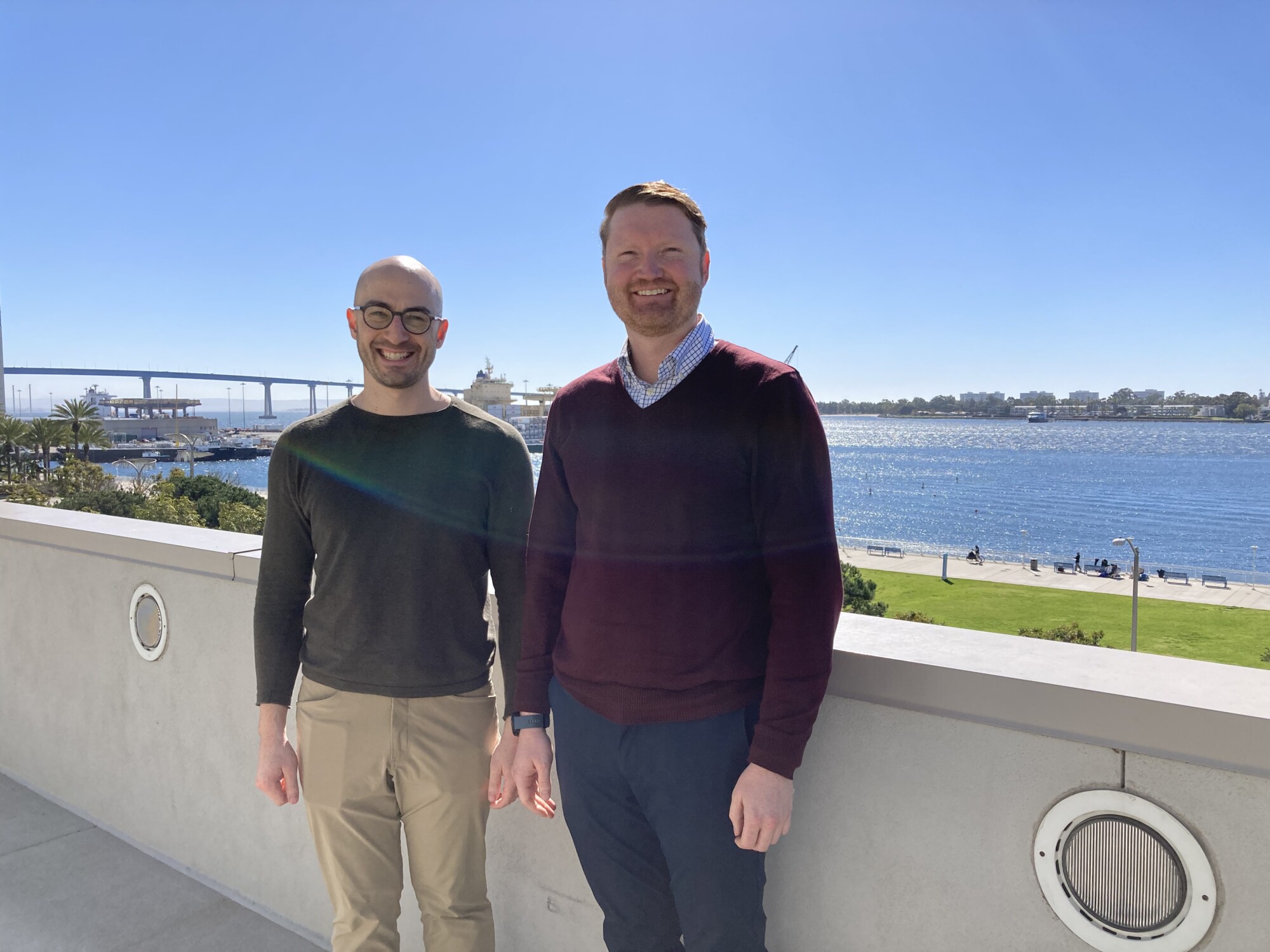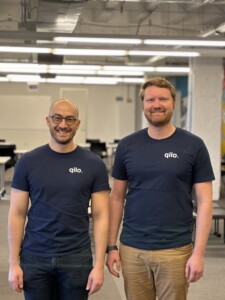DeltaClimeVT Founder Stories – Qilo
June 04, 2024

Through a pilot with Vermont Electric Coop, software startup Qilo is helping utilities understand the impact of electrification on both consumers and the grid.
Electrification of, well, pretty much everything, is widely seen as a path to reducing our reliance on fossil fuels and curbing greenhouse gas emissions. But what happens as we plug more and more heat pumps and electric vehicles into an already stressed electric grid? Are we truly reducing emissions? What happens to the cost of electricity? How can we avoid the rolling brown outs so many have endured when the grid is maxed? And how can utilities stay ahead of the green energy transition?
Dave Brost and Brett Adlard, founders of Qilo, believe that readily available data can be analyzed in new ways to provide answers to those questions.
“We’re spoiled at the utility with a wealth of data,” said Cyril Brunner, innovation and technology leader at Vermont Electric Cooperative. “We have tons of information about what’s happening on the system, but there’s no one at the utility who is combing through that information. We’re not big enough to have those resources internally.”
That’s where Qilo comes in. “Our company hinges on making complicated things simple,” said Adlard. “The data already exists, but it’s not accessible. If we can offer real business intelligence for real problems in a way that’s simple to understand, we can make better decisions.”
From thesis to business.
 Brost was in graduate school in Munich, Germany pursuing a second masters degree in power engineering, when he discovered the underutilized dataset that would become the foundation of Qilo. He took a year to deep dive into energy databases and algorithms, ultimately deciding to write his thesis on utilizing existing data to improve efficiency in the power grid. His idea caught the attention of the German government, with whom he planned to partner for an initial pilot. But that was the spring of 2020 and it soon became clear that Covid-19 would require him to head back to the States sooner rather than later.
Brost was in graduate school in Munich, Germany pursuing a second masters degree in power engineering, when he discovered the underutilized dataset that would become the foundation of Qilo. He took a year to deep dive into energy databases and algorithms, ultimately deciding to write his thesis on utilizing existing data to improve efficiency in the power grid. His idea caught the attention of the German government, with whom he planned to partner for an initial pilot. But that was the spring of 2020 and it soon became clear that Covid-19 would require him to head back to the States sooner rather than later.
Back in Chicago, locked down in his apartment, Brost began attending free online webinars about business and entrepreneurship hosted by his alma mater, Washington University in St. Louis, as well as Northwestern and the University of Chicago. “I didn’t have a business background,” he said, “so I just signed up for everything that year. Webinars, business pitches, everything I could find. It was the perfect time to do that.”
Through a mutual friend, he also connected with Adlard, a self-proclaimed “analytics junkie” with a background in financial data analytics and data science. Adlard had recently moved to Seattle and was looking for an opportunity to work in machine learning. Brost was looking for a partner to help him build out the technology. The pair founded Qilo in late 2020.
At first, Qilo was envisioned as a direct to consumer product, but Brost and Adlard realized that customers with enough background to be interested would be very niche, with little opportunity to scale. They decided instead to focus their solution on the utilities. “At the highest level,” said Brost, “we help utilities understand how the energy market is evolving and how they can manage costs going forward to benefit both themselves and their customers. It’s a strategic view of the grid from an economic standpoint.”
For example, as consumers adopt electric vehicles (EVs) and start charging their cars at home, the Qilo dashboard can help utilities understand how much new revenue is coming from EV charging, which can guide decisions around subsidies and incentives. It can also provide insight on load management. If customers are charging their EVs when they get home from work when costs are higher, the utility might consider a program to encourage charging at times of lower demand and therefore lower cost.
With that focus, Qilo applied to DeltaClimeVT Energy 2022, a Vermont-based accelerator for startups with climate and energy businesses. The program helped them to frame their business idea in the context of the market.
“The biggest thing was being able to talk to different utility stakeholders,” said Brost. “We gained so much perspective from cooperatives, municipal and investor-owned utilities, as well as regulators and Efficiency Vermont. Having access to decision-makers at a wide range of utilities allowed us to think more clearly about our offering and how it could solve their pain points.”
The economics of change.
In addition to honing their business plan, Qilo also landed a pilot with Vermont Electric Coop through DeltaClimeVT.
Initially, Vermont Electric Coop brought Qilo in to look at data for Beat the Peak, a voluntary program that encourages members to reduce energy use during peak times. The Qilo dashboard analyzed that dataset and then returned insight into how many people were actively participating. In other words, was the program working? Was it worth the resources the utility was putting into it? “In a very easy to understand, visual format they were able to tell us who was actually reducing their load,” said Brunner.
Qilo’s work with Vermont Electric Coop has since expanded. They recently performed an analysis of heat pump use among members. The Coop bases its incentive program off economic models, which rely on a variety of assumptions. Qilo was able to put real numbers against those models, revealing that members with heat pumps were using more energy than the models had predicted. “That’s a huge insight for us,” said Brunner. “It’s real life data that informs our incentive programs and how we communicate with members.”
“Being able to demonstrate financial value is really important,” said Brunner. “Our big picture strategy is to help our members through this energy transition. We are trying to go 100% renewable. We are trying to decarbonize. It’s early days in that transition. There are folks who will change because of the global mission of decreasing carbon, but there are even more who will change if they can save money.”
“We’re kind of ‘data scientists in a box’ for utilities that don’t have these resources internally,” said Adlard. “We can give utilities grid visibility where they haven’t had it before.”
Efficiency and Vermont’s aging infrastructure.
“If we’re going to make a green transition,” said Adlard, “we’re going to be plugging a lot more into the grid. If we’re going to decarbonize, for a lot of sectors, it’s electrification. That means we’re going to need hardware upgrades, but in the interim there is a lot of efficiency to be had by using software that can provide insight into demand response.”
“That’s the timing opportunity,” agreed Brost. “We want to stay ahead of the transition so that the grid can sustain these changes. We should not be having all these emergency grid situations around the country. The data is available, it’s just not being utilized.”
Here in Vermont, the infrastructure that makes up the electric grid–power transformers, circuit breakers, voltage regulators–is aging, with much of it built in the 1930s and 40s. “It still works,” said Brunner, “but this transition to EVs and heat pumps is going to put serious constraints on our infrastructure.”
To replace that hardware, says Brunner, will take a lot of time and a lot of money. “If we can understand better what’s happening and leverage programs that encourage certain behaviors, it decreases the amount of infrastructure we need to invest in and therefore the total rate pressure that the Vermonters face. We can help our members save money and make the transition to green energy.”
“We all have anecdotal things we’ve seen change in our lives,” said Adlard, an avid snowboarder. “Where I grew up, it used to snow a lot when I was a kid. Now we’re lucky if it snows at all. We’re seeing things change in our own lifetime and I want to be part of the solution.”
About DeltaClimeVT – A Climate Economy Business Accelerator
Managed by the Vermont Sustainable Jobs Fund (VSJF), the DeltaClimeVT business accelerator is a Vermont-based program serving startup and seed-stage ventures focusing on energy and climate economy innovation in the energy sector. The program provides an intense accelerated learning and business development process designed to test assumptions, expose, and remediate business vulnerabilities, prepare for significant investment, and provide a platform for rapid scaling. As a proven leader in sustainability, Vermont offers participants access to many entrepreneurial climate economy and energy experts throughout the program. For more details, visit deltaclimevt.com or contact Geoff Robertson at geoff @ vsjf.org.
About Vermont Sustainable Jobs Fund
In addition to offering the DeltaClimeVT business accelerator to startup and seed stage entrepreneurs, the Vermont Sustainable Jobs Fund (VSJF) provides business assistance, value chain facilitation, network development, and strategic planning to a wide range of stakeholders in the agriculture and food system, forest product, waste management, renewable energy, and environmental technology sectors. Located in Montpelier, Vermont, VSJF was created by the Vermont Legislature in 1995 to partner with state government, private sector businesses, and nonprofits to build a thriving economic, social, and ecological future for Vermont. www.vsjf.org
Read More Stories Like This:
- DeltaClimeVT climate economy business accelerator selects Energy 2024 cohort
- Medley Thermal Pilots Clean Energy Solution at Jay Peak
- ProsumerGrid wins the Vermont-based DeltaClimeVT Energy 2023
- The Power of Paying it Forward: An Interview with SaLisa Berrien, COI Energy
- Vermont Startup Bets on Better Data to Decarbonize Buildings
- Grid Fruit Founders Focus on Refrigeration to Help Cool the Planet
- Slowing Climate, Change One Window at a Time




